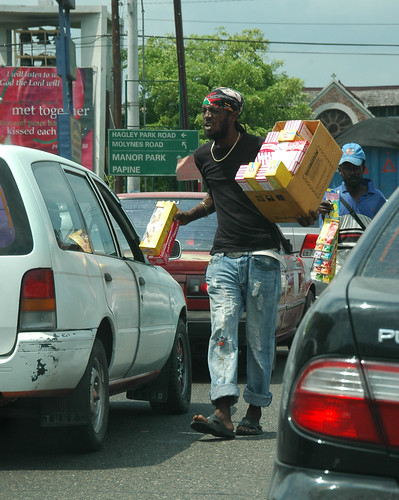The Burgher Gully Project is fast drawing to a close and I spent time with the group and with individuals this week. I am interviewing each of the youth to explore what has been the most important aspect of the programme for them, what should have been there that wasn't and what will be next.
I completed six interviews and already themes are emerging. The most important aspect appears to have been providing a safe and productive place for them to go in a community in which their alternative is hanging out on the corners. Access to adults whose focus is their best interest and whose attention is the development of additional skills for the participants is also emerging as important. We have not provided enough remedial help for reading, a critical learning for the programme as many of the youth are functionally illiterate.
Of interest to me was that of the six youth I have interviewed, five perceived themselves as having "completed" high school with either a Grade Nine high school certificate or a Grade 11 high school certificate and only subsequently discovered that this level of education was of little or no value in advancing to gainful employment given their literacy level. Of the six the one young woman I interviewed was clear and articulate about her gains. She has moved from hiding in her house and not interacting with anyone to attending every day and being ready to go and further her education. She is one of the few with CXCs (the national exam that provide "subjects") Having "subjects" is an acknowledged indicator of school success and has the potential to open some job doors. She is now feeling more confident and next week will complete application forms for various taining programmes, jobs and volunteer exeriences.
Another emerging theme is the propensity for the staff to do things for the youth as opposed to encouraging the youth to do things on their own with the support of the staff. For example the Assistant Youth Peace Facilitator has created a resume for each youth rather than getting each youth to develop his/her own resume. This is a theme I will explore with the staff as it is critical we teach the youth to take initiative and ask for support.
Taking initiative is not promoted in the education system here, with a much higher value placed on compliance, and that is a subject that could be explored from the perspective of the impact on the functioning of the Jamaican society!
I am feeling there are some clear directions in which I can re-write and improve the programme to submit for funding from UNICEF and other funders and foundations. So much to do, so little time!
The 5th Caribbean Conference on Dispute Resolution is moving forward.
 From months of inactivity and frustration on my part at my inability to get those committing to tasks to actually do them, the urgency of the time crunch (the conference is scheduled for April 28, 29, 30) seems to have motivated everyone. Two weeks ago I articulated my concern that we really were not going to pull this off. However, significant gains have been made this week, speakers confirmed, participants signed up, budget plan finalised, conference bags ordered,the conference team expanded. We still need 450 participant days to be paid for to cover the budget but the CEO is optimistic this will be achieved. This exercise has been the most graphic demonstration of the dissonance between my planning methodology and expectations and the DRF organisation cultural norm! It has challenged my ability sustain a facilitative role. It has challenged one of my learnings from the last eighteen months, that in Jamaica if the decision is to do something it will get done, despite all appearances otherwise and the apparent impossibility to pull it off. But the week has enabled me to retrieve my faith and I am now almost convinced we will pull this off!
From months of inactivity and frustration on my part at my inability to get those committing to tasks to actually do them, the urgency of the time crunch (the conference is scheduled for April 28, 29, 30) seems to have motivated everyone. Two weeks ago I articulated my concern that we really were not going to pull this off. However, significant gains have been made this week, speakers confirmed, participants signed up, budget plan finalised, conference bags ordered,the conference team expanded. We still need 450 participant days to be paid for to cover the budget but the CEO is optimistic this will be achieved. This exercise has been the most graphic demonstration of the dissonance between my planning methodology and expectations and the DRF organisation cultural norm! It has challenged my ability sustain a facilitative role. It has challenged one of my learnings from the last eighteen months, that in Jamaica if the decision is to do something it will get done, despite all appearances otherwise and the apparent impossibility to pull it off. But the week has enabled me to retrieve my faith and I am now almost convinced we will pull this off! Your help would be appreciated - please register at http://www.drfja.org/
Last evening was spent enjoying dinner and conversation with the new volunteers who had arrived over the last four days. They come from Ghana, Trinidad/Tobago, and the east and west coasts of Canada. Their enthusiasm and curiosity about the contribution they will be able to make to the organisations they are joining was delightful. They bring expertise in human rights, human resources, court management services and victim support. It was interesting for those of us who have been here for a while to have an opportunity to share some of our learnings and experiences, however, it was also a reminder that new volunteers are arriving because some of us are preparing to leave. I find much of my work and discussion is now framed by transferring responsibilities to others and ensuring that my transition does not impact the potential of the work to continue to move forward. As yet there is no Youth Advisor identified to assume my responsibilities, but there is a great Youth Programme team whose commitment will facilitate continuity.
Therein lies the essence of my week. Each day has started with a cloudless blue sky, unusu
 butterflies and mosquitoes are prolific. The fruit vendors offer bags of sweet apples, star apples, sour sop and naisberries as they wander up and down between the traffic. Every other day there is the late afternoon deluge, sometimes where I am but often in the near distance. The rain can be remarkably localised, drenching one area and missing another completely. I can frequently avoid the deluge by route or timing. I have also acquired the Jamaican habit of not going out into the rain, though not going in if caught in the rain. My umbrella returns as my steady companion, and I have acquired some skill in determining at the beginning of the day if it will be a day that brings rain or not. And as more evidence of having become a part of this wonderful place my walk to and from work always includes greetings and chats with familiar faces, often students who have been at the programme who greet me as "Auntie Jacquie" and assure me as we chat, that they are keeping out of trouble! There is much I am going to miss.
butterflies and mosquitoes are prolific. The fruit vendors offer bags of sweet apples, star apples, sour sop and naisberries as they wander up and down between the traffic. Every other day there is the late afternoon deluge, sometimes where I am but often in the near distance. The rain can be remarkably localised, drenching one area and missing another completely. I can frequently avoid the deluge by route or timing. I have also acquired the Jamaican habit of not going out into the rain, though not going in if caught in the rain. My umbrella returns as my steady companion, and I have acquired some skill in determining at the beginning of the day if it will be a day that brings rain or not. And as more evidence of having become a part of this wonderful place my walk to and from work always includes greetings and chats with familiar faces, often students who have been at the programme who greet me as "Auntie Jacquie" and assure me as we chat, that they are keeping out of trouble! There is much I am going to miss. Next week I will continue with interviewing the youth at the Burgher Gully project and moving all the areas in which I am involved into transition planning. Six weeks seems little time to wrap up all that I have been involved in here, and also feels like too little time left!













